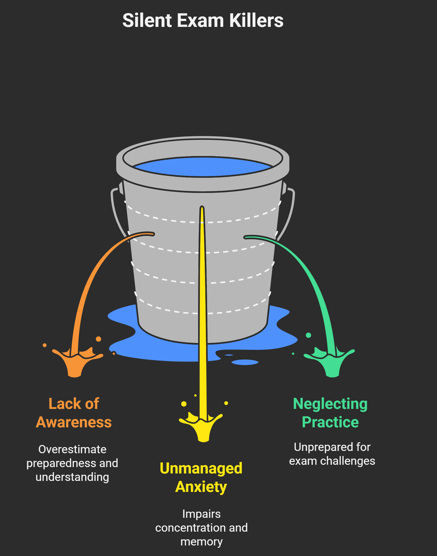3 Silent Killers of Your Exam Marks No One Talks About — Avoid These NowSEO Meta Description
- Rahul Subuddhi
- Sep 24
- 3 min read

3 Silent Killers of Your Exam Marks No One Talks About
Introduction
Many students invest tremendous effort into studying but remain puzzled when their exam marks don’t reflect their hard work. The problem often isn’t how much you study but how you study and unseen psychological and strategic factors undermining your performance silently. Here are three silent killers you need to know and tackle.
Silent Killer 1: Lack of Metacognitive Awareness
What it means:Metacognition is your ability to monitor and regulate your own learning—knowing what you know and how well you know it. Many students overestimate their preparedness by confusing familiarity with real understanding.
Why it’s deadly:Without metacognitive skills, you can’t identify weak topics correctly or efficiently allocate your study time, leading to overconfidence and unpreparedness on exam day.
How to fix it:Regularly self-test and honestly evaluate your understanding. Use active recall, spaced repetition, and teach-back methods to build true mastery.
Silent Killer 2: Unmanaged Exam Anxiety
What it means:Stress and anxiety can impair concentration, memory retrieval, and decision-making during exams — drastically lowering your effective performance despite preparation.
Why it’s deadly:Anxiety can cause mental blocks, second-guessing, and rushed answers, reducing the marks you could otherwise earn.
How to fix it:Practice mindfulness, breathing techniques, and timed practice tests to build exam-day confidence. Physical exercise and adequate rest are essential for emotional regulation.
Silent Killer 3: Neglecting Practice in Real Exam Conditions
What it means:Studying without replicating the pressure, timing, and environment of actual exams can leave you unprepared for the unique challenges of exam day.
Why it’s deadly:Without practice under real conditions, you may mismanage time, misinterpret questions, or panic at unexpected difficulties.
How to fix it:Simulate exam conditions by timing yourself during mock tests in a quiet, distraction-free space. Review and adapt based on your performance.
Conclusion
These three silent killers lurk behind unexpected low exam scores. Recognizing and addressing metacognitive skills, exam anxiety, and realistic practice can dramatically improve outcomes. Work smarter by tackling these hidden challenges and elevate your exam performance. 10 Student Questions with Answers
Q: What is metacognitive awareness, and why is it important for exams?
A: Metacognitive awareness means knowing how well you understand material and recognizing gaps. It helps you focus on weak areas for effective studying.
Q: How can I tell if I am confusing familiarity with real understanding?
A: If you can’t recall or explain concepts without looking at notes, or fail in self-tests, you might just be familiarizing rather than mastering.
Q: What methods improve metacognitive skills?
A: Use active recall, spaced repetition, and teach-back methods where you explain topics to someone else.
Q: How does exam anxiety affect my performance?
A: Anxiety can block memory retrieval, cause second-guessing, and lead to rushed or incomplete answers, lowering marks.
Q: What are practical ways to manage exam anxiety?
A: Practice mindfulness, deep breathing, and timed mock exams; also maintain good sleep and exercise routines.
Q: Why is practicing in real exam conditions important?
A: It helps build familiarity with time pressure, environment, and stress, so you can manage these challenges better during the actual exam.
Q: How can I simulate exam conditions while practicing?
A: Take timed mock tests in a quiet, distraction-free area without breaks or help, just like the real exam.
Q: What happens if I don’t practice under real exam conditions?
A: You may mismanage time, feel overwhelmed during the test, or make careless mistakes due to unfamiliarity with pressure.
Q: Can metacognitive skills help reduce exam anxiety?
A: Yes, knowing your strengths and weaknesses boosts confidence and reduces uncertainty-related stress.
Q: If I want, can you prepare an infographic or checklist to tackle these silent killers?
A: Yes, an infographic or checklist can provide a quick, practical guide to incorporate these strategies effectively. #ExamTips #ExamAnxiety #Metacognition #StudyStrategies #ExamPreparation #StudentSuccess #ExamStress #StudySmart #ExamMotivation #BetterGrades #ExamReady2025 #TimeManagement



_edited.jpg)


































monero miners monero miners
monero miners monero miners
monero miners monero miners
monero miners monero miners
monero miners monero miners
monero miners monero miners
etc mining etc mining
monero miners monero miners
monero miners monero miners
monero miners monero miners
monero miners monero miners
monero miners monero miners
monero miners monero miners
etc mining etc mining
monero miners monero miners
monero miners monero miners
monero miners monero miners
monero miners monero miners
monero miners monero miners
monero miners monero miners
etc mining etc mining
monero miners monero miners
monero miners monero miners
monero miners monero miners
monero miners monero miners
monero miners monero miners
monero miners monero miners
etc mining etc mining
monero miners monero miners
monero miners monero miners
monero miners monero miners
monero miners monero miners
monero miners monero miners
monero miners monero miners
etc mining etc mining